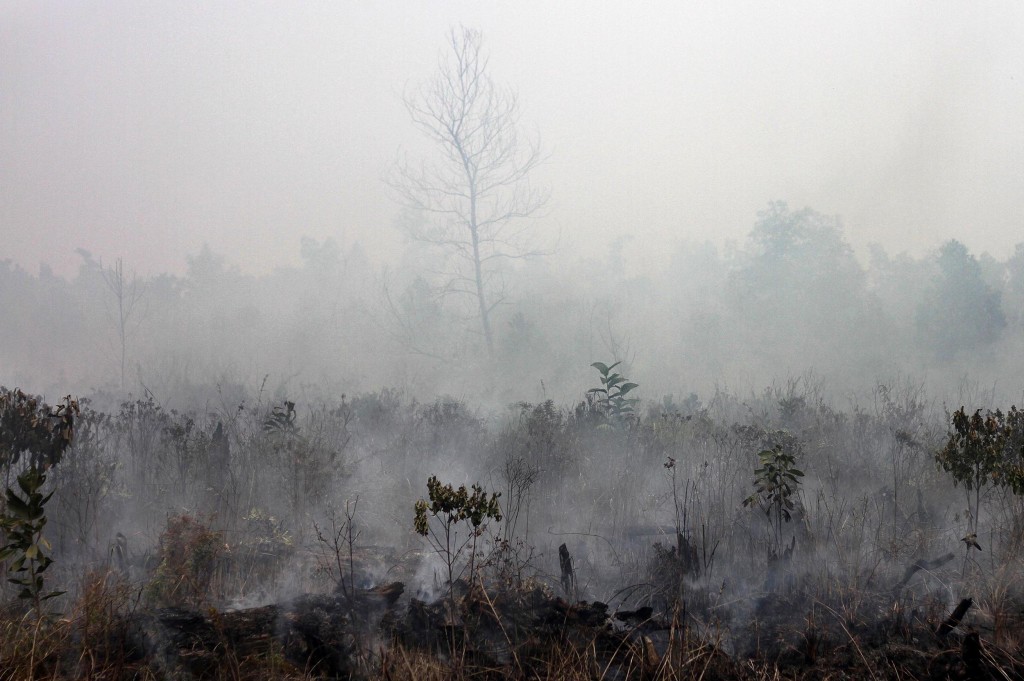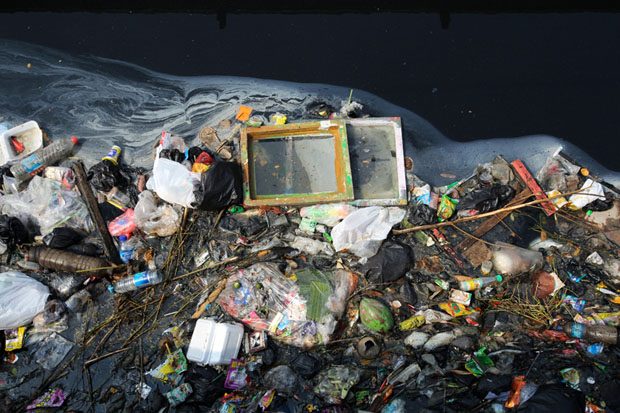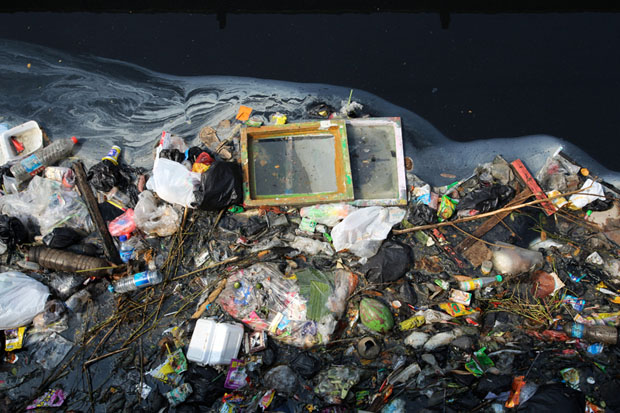
Peatland fires in Pekanbaru, Riau. Will the newly elected parliament finally ratify the ASEAN Transboundary Agreement on Haze pollution? Photo credit: NBC news.
As an archipelagic nation heavily dependent on natural resources, one may assume that issues related to better environmental and natural resource management would be at the forefront in the current Indonesian legislative and presidential elections.
But apparently not.
Abetnego Tarigan, executive director of Walhi (Indonesian Forum for Environment), claims that only seven per cent of 6,608 legislative candidates running for the national seats have somewhat a degree of understanding about environmental issues.
Such a small percentage is a worrying indicator. The next members of parliament and president will face tremendous environmental challenges and their success in managing Indonesia will be determined, among others, by whether they can improve the current natural resource management regime and significantly reduce environmental degradation.
The National Agency for Disaster Management (BNPB) reveals that for the period of 1815-2014, environmental and climate related disaster events have been prevalent. These include floods (38 per cent), strong wind (21), landslides (16), and drought (12).
Flooding, for instance, is not only a frequent and recurrent event occurring in Jakarta, the nation’s capital, but also nearly everywhere in this archipelago, especially when the wet season sustains heavy tropical rainfall.
A study published by the United Nations Environment Program (UNEP) estimates that between April 2010 and 2013, flood events in Kalimantan have inundated between 197,000 and 360,000 houses and displaced between 776,000 and 1.5 million people, resulting in significant social and economic costs.

Last year, Jakarta saw some of the worst flooding the capital has experienced since 2007. Photo credit: AP.
This situation is likely to continue across Indonesia since the Intergovernmental Panel on Climate Change (IPCC) projects that in the coming decades the country may receive less rainfall between July and October, but increased rains (and higher intensities) are expected during the wet season.
Surprisingly, it is rare to hear legislative and presidential candidates mentioned such an issue during their recent campaigns.
Another environmental issue that frequently embarrasses Indonesia is transboundary haze resulting from forest and land fires in Sumatra and Kalimantan – as a direct consequence of forest and peat land conversion as well as agricultural land preparation using fires.
The previous and current DPR (House of Representatives) has been known as the institution that continuously refuses to ratify the ASEAN (Association of Southeast Asian Nations) Agreement on Transboundary Haze Pollution, even though all other ASEAN members had done so.
The new DPR members have, therefore, a crucial decision to take whether to ratify this Agreement and seriously help the executive branch of the government to address this national and regional issue. With only less than ten per cent of legislative candidates understanding environmental issues, the issue could remain in a standstill.
Another important challenge with regard to natural resource management and environmental protection, and is seldom mentioned by legislative and presidential candidates is the future development platform of Indonesia, particularly whether the country will still depend heavily on natural resource exploitation.
In general, natural resources and commodities, such as oil, gas, coal and crude palm oil (CPO) – making up around 50 per cent of Indonesia’s exports – have contributed significantly to Indonesia’s economic strength.
Continuous natural resource exploitation, however, has led to resource depletion and will eventually shake the very foundations of Indonesia’s exports and economy. In fact, it has already damaged the economy if we see the oil subsidies as part of the problem, costing the government Rp306.5 trillion (US$31.5 billion) in 2012 – much higher than in 2010 (Rp139.9 trillion or US$14.4 billion).
The future of Indonesia’s economic growth and commodity exports depends on whether the country can manage its resources wisely. It is, therefore, quite alarming if only few candidates have highlighted such an important issue.
In fact, it is difficult to find a political party or candidate that, for instance, has a policy platform that argues for the need to shift Indonesia’s development toward more efficient in using its natural resources, put sustainability standards onto key development sectors and industries, and re-invest revenues coming from natural resource exploitation into appropriate technology, renewable energy development and accelerated human resource development.
Without clear policies and enforcement, natural resource exploitation will only lead to resource depletion and affect the country’s energy supply, employment and food security.
Evidence suggests that destructive, illegal and uncontrolled resources extraction in forestry, agriculture, mining and fishery sectors, has led to not only unwanted environmental impacts such as droughts, floods, landslides, pollution, climate change and loss of biodiversity, but also social and economic impacts including loss of economic productivity and social conflicts.
Regardless of their weaknesses, there have been progressive policies issued in the period of the current government. These include national action on greenhouse emissions reduction, forest and peat land conversion moratorium as well as the acknowledgement of customary forests by the constitutional court.
Such policies can only result in real outcome if these can be continued or strengthened by the upcoming elected government and parliament.
These government and parliament hence need to be reminded about the ‘missing’ but important questions of Indonesia future – the future that depends on policies that conserve and sustainably manage the country’s fragile environment and natural resources.
Presidential candidates and political parties supporting them have until July to convince Indonesian population that they are serious thinking about Indonesia and reforming the country for the better.
Fitrian Ardiansyah is climate and sustainability specialist, a doctoral candidate at the Australian National University, and the recipient of Australian Leadership Award and Allison Sudradjat Award. He can be reached at [email protected].
 Facebook
Facebook  Twitter
Twitter  Soundcloud
Soundcloud  Youtube
Youtube  Rss
Rss 
